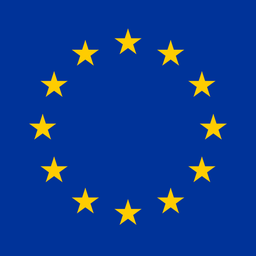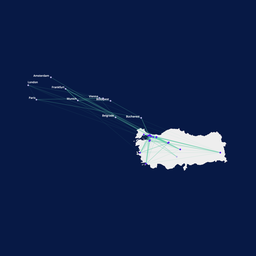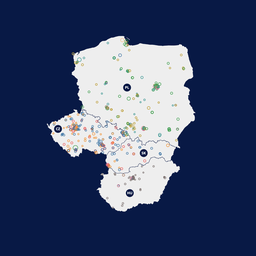Find out why it's an extremely important time for the technical community to contribute to Internet governance, and how you can make your voice heard.
The next couple of years will be a particularly crucial time for Internet governance, with several UN processes taking place that have the potential to significantly impact the way in which the Internet is governed — including the role that different processes, platforms and actors will play in continuing to shape the Internet. As one of the organisations entrusted with operating a fundamental aspect of the global Internet’s technical infrastructure, and as secretariat for the larger RIPE community, we’ve been following these developments closely.
As we head into another Internet Governance Forum that takes place next week in Kyoto and online, we wanted to share some of these developments and urge you to get involved at this critical time.
Background
The UN Secretary-General published a report called Our Common Agenda in 2021, in which he proposed a Global Digital Compact (GDC) that would establish “shared principles for an open, free and secure digital future for all.” It was unclear at the time (and is still being decided) exactly how this GDC would impact the current Internet governance landscape, which already has a long history and established processes in place, primarily via the Internet Governance Forum.
The Global Digital Compact is to be decided on at a Summit of the Future that will take place during the UN General Assembly in New York in 2024. The work being done on the GDC has also led to related ideas, such as creating a new annual Digital Cooperation Forum to support national governments, the private sector and civil society in evaluating the implementation of the GDC, setting policy priorities and developing policy recommendations, among other objectives. In 2022, an IGF Leadership Panel was also created that now co-exists alongside the IGF’s Multistakeholder Advisory Group. Many different stakeholders, including national governments, have expressed concerns about what all of this means for Internet governance.
Against this backdrop, we’ve also heard more and more calls from national governments, supranational institutions and intergovernmental organisations for a more multilateral approach to decisions around how to govern and operate this global resource that we all depend so heavily upon and for which the technical community has long been a trusted steward.
The technical community’s role
As stewards of the Internet’s core functions and operations, it is the technical community that safeguards the singular, global, interoperable Internet. The experts and operators who have been developing and maintaining the Internet’s technical layers since its inception are best suited to fully understand the practical and operational implications of how we, as society at large, decide to govern this global resource as it becomes ever more firmly embedded in our daily lives.
It was precisely for these reasons that the unique role of the technical community has long been recognised in Internet governance spheres, and was enshrined in the Tunis Agenda, the outcome document from the UN’s World Summit on the Information Society (WSIS) in 2005. It was this document that converged on a definition of Internet governance and highlighted the importance of multistakeholder participation in governance processes, and has served as a foundation for Internet governance principles ever since.
In the WSIS+10 outcome document, which was the result of a 10-year review of the WSIS implementation and outcomes, the importance of the participation of all stakeholders, including the technical community, was again highlighted as a crucial component of Internet governance.
Why is it so important to recognise the unique roles that different stakeholders play in the complex landscape of Internet governance? The answer is that different stakeholders tend to focus on and have expertise within very different realms. For example, civil society groups generally focus on Internet governance topics including safety and privacy online, freedom of expression, human rights and equitable access (to name a few). The private sector is usually concerned with issues around innovation, open markets and competition. More and more, we’ve seen governments focusing on digital sovereignty, security and the protection of critical infrastructure.
Complementary to all this, the technical community typically focuses on, well, the technical aspects of running and developing the Internet. All of these different perspectives are incredibly important — but they’re also very distinct from one another. As such, it’s important to recognise and include the views from all stakeholders, including the technical community, in the important Internet governance discussions that are playing out on the global stage right now.
But there’s another issue at play here. Aside from recognising various individual stakeholder groups and their unique contributions to Internet governance, it’s just as important to recognise the role of the existing Internet governance processes and venues themselves. It was the Tunis Agenda that also established the annual Internet Governance Forum (IGF) as the primary venue for all stakeholders to come together to debate and discuss Internet governance matters, and the IGF has made valuable contributions to the ways in which we govern the Internet since its inception. This is why there are concerns about new processes (like a Digital Cooperation Forum) that could end up duplicating existing efforts or crowding an already full and complex landscape in which it’s becoming increasingly difficult to follow all the different discussions taking place in different fora.
Ultimately, however, it is national governments that have control over how the Internet is governed within their borders, and the global Internet will cease to exist as we know it if national laws and regulations begin to contradict one another or interfere in any other myriad ways with the Internet’s global interoperability. The potential for fragmentation and other dire consequences is a very real threat, but one that can be mitigated by including input from technical experts. By working with the technical community, as well as all other stakeholders, governments can achieve a nuanced and comprehensive understanding of the implications of their governance proposals to ensure that we balance their need for security and sovereignty, citizens’ needs for safety, privacy and freedom of information online, the private sector’s drive towards economic growth and innovation — all while safeguarding the core functions that enable an interoperable, global Internet.
Together, let’s make our voice heard
This is why it’s so important for governments to seek input from the technical community in their legislative proposals. We believe it’s vitally important for governments to respect the importance of including all stakeholders’ input as early on in the process as possible. (See our work on the NIS 2 Directive for a positive example of how the technical community worked with EU legislators to help safeguard the resiliency of the Internet in Europe.)
There are some governments that would like to see Internet governance move to a more multilateral approach, and they’re using UN platforms like the Global Digital Compact, the ITU and the Open-ended working group on Information and Communication Technology (OEWG) to get other like-minded states on board and push for that shift.
The GDC, the Summit of the Future and the Digital Cooperation Forum are major developments within the Internet governance sphere. Alongside all of that, WSIS will undergo another review in 2025, (WSIS+20), in which the WSIS outcomes will be reviewed and the IGF’s mandate may or may not be renewed. All of these developments have the potential to massively change the way that the Internet is governed for years to come. That means that now is the time for the technical community to make its voice heard and continue to have a seat at the various governance fora.
You can find the RIPE NCC’s contributions to the Global Digital Compact here (along with all our contributions to other open consultations on governance and regulatory matters) and can read more about recent Internet governance developments here. We regularly update the community about regulatory developments that require input from the RIPE community on RIPE Labs. We hope you’ll follow some of the discussions taking place at the IGF next week, where the RIPE NCC is organising a workshop on “Increasing routing security globally through cooperation” and will be liveblogging the event on RIPE Labs (you can read last year’s here). Finally, the RIPE NCC Academy also has a new course available on Internet governance that is free and open to everyone, and explains how you — the technical community — can get involved in Internet governance.
The involvement of the technical community is absolutely essential to ensure that the Internet is governed in a way that allows it to continue to scale, adapt and thrive. Safeguarding our unique position in multistakeholder processes is the only way to make that happen.





Comments 0
The comments section is closed for articles published more than a year ago. If you'd like to inform us of any issues, please contact us.